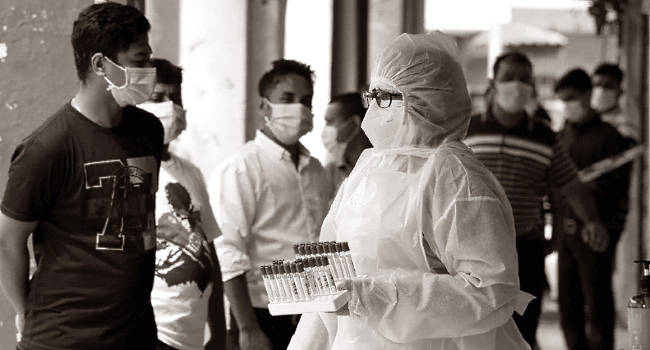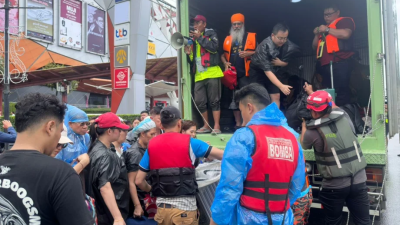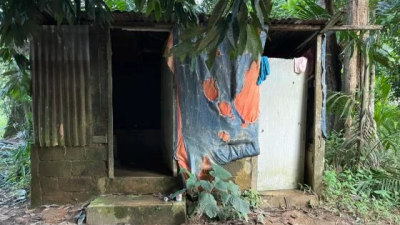Sin Chew Daily
On January 12, the government concurrently introduced MCO 2.0 and a state of emergency in hope of curtailing the spread of the coronavirus.
On the same day, Istana Negara said in a statement that the bed occupancy rate at the 15 specialized COVID-19 hospitals in the country was more than 70%. Soon afterward, the health ministry announced that the government might enlist part of the medical resources at private hospitals to treat COVID-19 cases. Meanwhile, government hospitals would no longer take in COVID-19 patients referred by private hospitals.
Let's take a look at how serious the situation has become. As of January 18, Malaysia reported a cumulative total of more than 160,000 positive cases with almost 40,000 active cases being treated at hospitals.
Given the current trend of around 3,000 new cases each day, it looks like the numbers are not going to come down anytime soon. If we do not adopt the emergency measure of enlisting medical resources at private hospitals, it is a matter of time specialized COVID-19 hospitals in the country will be completely overwhelmed.
Association of Private Hospitals Malaysia (APHM) president Dr Kuljit Singh said the association had instructed private hospitals in the country to reserve at least 10% of their beds to take in COVID-19 patients. He said he had contacted 146 private hospitals in the country in order to get a better picture of their bed supply, medical facilities and technologies.
If each of the 201 private hospitals in the country would set aside 20 to 30 beds to treat COVID-19 cases, we should have sufficient beds to relieve the burden of our strained public healthcare system.
Kuljit Singh has pro;posed that private hospitals only treat early stages of COVID-19 cases, while stages 4 and 5 patients will be sent to government hospitals. Stages 1 and 2 refer to cases with no or light symptoms while stages 4 and 5 are severely ill patients that may require ventilators or suffer from complications in other body organs.
Health DG Noor Hisham Abdullah has pointed out that the ministry is exploring several possibilities to mitigate the bed shortage problem, including sending asymptomatic cases and cases with light symptoms to "quarantine and low-risk treatment centers" (PKRC), hotels or be put on home quarantine.
Whatever solutions adopted, we must still address the following problems in order to effectively contain the spread of the virus.
1. All SOPs under MCO and emergency ordinance must be strictly adhered to. Unfortunately we still have ministers taking off their masks to have a meeting, and Umno Youth distributing some 2,000 frozen chickens to a massive crowd of people. Such actions must be condemned in the strongest terms, and not just treated leniently with a word of warning.
2. Medical resources must be efficiently deployed, including enlistment of private hospitals for the treatment of COVID-19 cases and staged management of COVID-19 patients. Only very severe cases should be sent to general hospitals, UH or Sungai Buloh, while smaller local hospitals can handle less severe cases. This will help optimize the utilization of our limited resources.
3. The government, private hospitals and insurance companies must settle the issue of medical costs entailed in the treatment of COVID-19 cases.
4. Set up a "health and scientific COVID-19 advisory group". PM Muhyiddin has already agreed to set up such a group made up of epidemiologists and medical professionals who can offer invaluable advice to the government on COVID-19 management.
Neither health minister Adham Baba nor health DG Noor Hisham are epidemiologists by training, while Khairy Jamaluddin responsible for vaccine procurement is a complete outsider. It is now time to take in professionals to help fight the virus!
5. Vaccines must be made available as soon as possible. Khairy said recently that the country's vaccination program would take 18 months. The thing is, experts from China and Russia have estimated that the antibodies will only last between five and ten months. How are we going to achieve herd immunity with an 18-month long vaccination program?
The minister said Malaysia would still be one of the earliest Southeast Asian countries to have access to the vaccines, but will we complete our vaccination program earlier than countries like Japan or South Korea? Bear in mind that the five Asean countries of Laos, Brunei, Cambodia, Vietnam and Thailand have only reported a combined 14,245 positive COVID-19 cases, barely 9% of our total infections. Is our minister aware of this?
Looks like we need some real experts to offer their professional advice to our government.

ADVERTISEMENT
ADVERTISEMENT


































